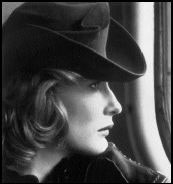CHARLOTTE GRAY
directed by Gillian Armstrong with Cate Blanchett, Billy Crudup, and Michael Gambon opens Jan. 11 at Harvard Exit
IN SOME WAYS, Charlotte Gray has come out at a very inopportune time. For while a big sweeping World War II romance with lovely Cate Blanchett serving in the French Resistance sounds perfect for our flag-waving times, this isn’t quite the feel-good epic of lovers separated by vast and sinister forces that you might expect. What we’re told these days is that war is a straightforward contest between good and evil and that violence rarely has unexpected consequences. What this film suggests is that the capacity to do good and the capability to do ill are bound together in times of crisis.
Adapted from the 1998 novel by Sebastian Faulks, Gray tells the story of a Scotswoman who’s recruited by the British secret service to go undercover in occupied France. Charlotte later accepts the dangerous assignment partly from a sense of patriotic duty and partly because her beloved, a dashing airman, has been shot down over France. Her motives become even more ambiguous since her quest to find out if he’s alive leads her to compromise her very first mission—and causes the death of a colleague.
Her loyalties are further divided by the passionate Resistance fighter Julien (Billy Crudup). Not only do amorous sparks ignite, but she’s then asked to nanny two parentless young Jewish boys. Meanwhile, she develops a tentative friendship with Julien’s father (the shambling and magnificent Michael Gambon).
War may indeed be hell, but rural France has rarely looked so good. At first it seems bizarre that director Gillian Armstrong works so hard to capture the romance of the cobbled village streets, the gently rolling countryside, the quaintly disintegrating country houses. When German soldiers finally appear, it’s like having a swastika stamped over a scenic postcard.
Blanchett sure is popular right now, with roles in everything from Lord of the Rings to The Shipping News, but this role may well be the best of the bunch. The constant shifting of allegiances and loyalties, and Charlotte’s refusal to succumb to either despair or a cynical acceptance of “the game,” presents a vastly complex obstacle course for an actress—yet one that she hurdles with ease. The same can be said for the film as a whole: Armstrong’s accomplishment is not only to tell an unexpected and original story, but to do so with an easy and elegant grace.








